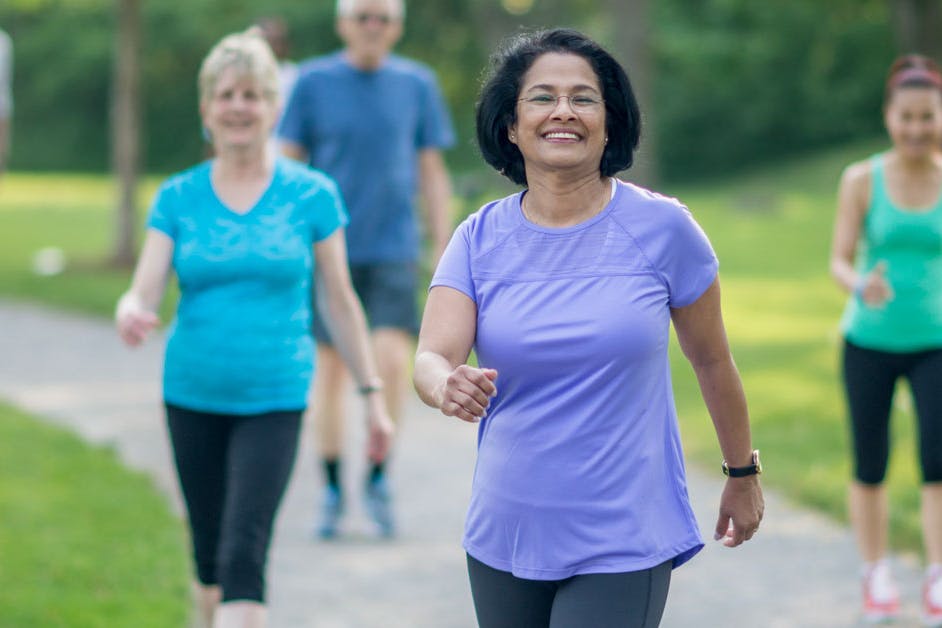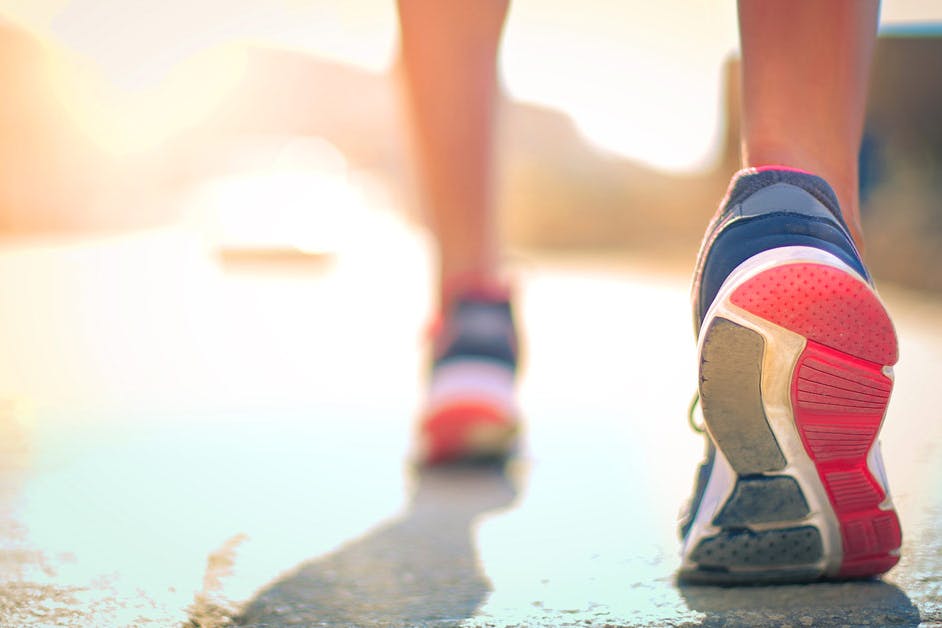Why Walking is Good for Your Overall Health
Feel like the years are constantly taking their toll on your health and your waistline? Evidence shows that walking could be the ticket to not only getting fit, but staying fit. Learn why.

Learning to walk is the literal first step towards independence. Our two-footed gait is the primary distinguishing factor between man and all other animals. It also happens to be one of the best exercises for your overall health and wellbeing.
4 Reasons Walking Promotes Good Health
1. Walking Helps You Avoid Weight Gain
The vast majority of health and fitness articles tout the importance of weight lifting and high-intensity interval training (HILT). However, research suggests walking may actually be the ticket to getting fit for most Americans.
A 2009 study lead by Penny Gordon-Larsen, PhD, published in The American Journal of Clinical Nutrition, revealed the average American gains 2.2 pounds a year during middle age. However, during the 15-year study, Larsen and her team also found that those who walked gained significantly less weight than those who didn’t.
2. Walking Offers a Low-Impact Way to Increase Calorie Burn
Popular wisdom says to stand rather than sit if you want to lose weight. However, the 2016 study, ‘Energy Expenditure During Acute Periods of Sitting, Standing, and Walking’ published in the Journal of Physical Activity and Health, showed standing actually did little to increase the number of calories an individual burned.
It was walking that made the difference. The study showed participants who walked for an hour burned an extra 130 calories.
3. Walking Reduces the Event of Experiencing a Cardiovascular Event
Not only can walking help keep your waistline from expanding, it can protect your heart. Two scientists from the University College of London sifted through 4,295 articles published between 1970 and 2007. Identifying 18 studies that met their standards for quality, they performed a meta-research study, ‘Walking and primary prevention: a meta-analysis of prospective cohort studies.’ The analysis showed walking reduced the risk of cardiovascular events by 31%!
4. Walking can be Done Practically Anywhere
When it comes to exercise, a lot of activities require special equipment. From a precise playing arena (think soccer and basketball) to specific weather conditions (think snowboarding and surfing), working out can require an immense investment. Walking doesn’t.
All walking requires is space. You can walk on the sidewalk. You can walk in a park. There are mall walkers and trail walkers. There are individuals who walk to work and those who walk to sightsee. As long as there is space, you can walk!
Learn How to Supercharge Your Weight Loss Goals with Medically Supervised Weight Loss!

Because walking is so easy on your joints, it's one of the best forms of exercise you can keep enjoying throughout your life.
9 Ways to Incorporate More Steps into Your Daily Routine
Ready to get results, improve your health, and lose those excess pounds for good? Use these nine tips to incorporate additional steps in your daily routine.
1. Park at the Back of the Lot
It might not seem like a lot, but every little bit counts. Depending on how big the lot is, parking at the back might result in walking an extra quarter mile round trip.
2. Store Commonly Used Items Farther Away
Find you spend most of the day sitting at work? You’re not alone. Most Americans lead an extremely sedentary lifestyle. Force yourself to get up and move. Place commonly used items, like the printer, at the far end of the office to encourage additional walking throughout the day.
3. Get an Activity Tracker
It may seem like activity trackers are the latest trend that will soon expire. But these handy little devices can offer valuable insights into how active you really are. They can help you monitor your improvement. Some trackers are even equipped with motivation tools, rewarding you with badges for new achievements and encouraging you to keep moving throughout the day.

Who wants to walk when their feet hurt? Make sure to get a pair of comfortable shoes, so that walking is enjoyable.
4. Wear Comfortable Shoes
Let’s face it, when your feet hurt, you’re likely to sit down. And few things make your feet hurt more than uncomfortable shoes. Make walking as enjoyable and pain-free as possible by wearing comfortable shoes.
5. Set an Alarm
Have trouble remembering to move? It happens. We can all get so wrapped up in a task that we forget to stop and stretch our legs. Try setting an alarm as a reminder. Short breaks have even been shown to increase productivity.
6. Schedule a Friend-Walking Date
The idea of walking make you cringe? Turn it into something you look forward to. Schedule a walk date with a friend you enjoy. You’ll be amazed how quickly time flies and you rack up steps.

When you're focused on walking the dog, it's easy to forget that you're exercising.
7. Give a Dog Some Love
While you may count unconditional love as the best thing about owning a do, research suggests that owning a dog can be good for your health. Allison Aubrey’s recent NPR article, ‘Dog Owners Walk 22 Minutes More Per Day. And Yes, It Counts As Exercise’, explored the topic. Aubrey identified evidence that walking lowered the risk of high blood pressure, high cholesterol, and Type 2 diabetes.
8. Take Phone Calls on the Go
Whether you’re chatting with one of the other soccer moms, checking in with a college or catching up with a college roommate, take the call on the go (when possible). Even pacing your office can help raise your heart rate and burn more calories.

Walking to the coffee shop with a co-worker is a great way to take a break, stretch your legs, and rack up some steps.
9. Walk to the Coffee Shop
Turn your daily coffee stop into another excuse to rack up some steps. Walk to the coffee shop rather than drive. You might even bring a friend or co-worker with you to talk while you walk.
Jumpstart Your Weight Loss Goals
Sometimes walking isn’t enough to help you get the results you want, especially in the time frame you want to achieve them. Medically supervised weight loss can give you the professional insight and support you need to lose weight fast and keep it off.



